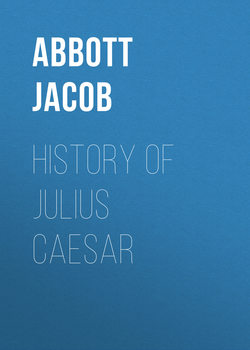History of Julius Caesar

Реклама. ООО «ЛитРес», ИНН: 7719571260.
Оглавление
Abbott Jacob. History of Julius Caesar
PREFACE
JULIUS CAESAR
CHAPTER I. MARIUS AND SYLLA
CHAPTER II. CAESAR'S EARLY YEARS
CHAPTER III. ADVANCEMENT TO THE CONSULSHIP
CHAPTER IV. THE CONQUEST OF GAUL
CHAPTER V. POMPEY
CHAPTER VI. CROSSING THE RUBICON
CHAPTER VII. THE BATTLE OF PHARSALIA
CHAPTER VIII. FLIGHT AND DEATH OF POMPEY
CHAPTER IX. CAESAR IN EGYPT
CHAPTER X. CAESAR IMPERATOR
CHAPTER XI. THE CONSPIRACY
CHAPTER XII. THE ASSASSINATION
Отрывок из книги
It is the object of this series of histories to present a clear, distinct, and connected narrative of the lives of those great personages who have in various ages of the world made themselves celebrated as leaders among mankind, and, by the part they have taken in the public affairs of great nations, have exerted the widest influence on the history of the human race. The end which the author has had in view is twofold: first, to communicate such information in respect to the subjects of his narratives as is important for the general reader to possess; and, secondly, to draw such moral lessons from the events described and the characters delineated as they may legitimately teach to the people of the present age. Though written in a direct and simple style, they are intended for, and addressed to, minds possessed of some considerable degree of maturity, for such minds only can fully appreciate the character and action which exhibits itself, as nearly all that is described in these volumes does, in close combination with the conduct and policy of governments, and the great events of international history.
ANCIENT ROME.
.....
But with all their prowess and skill as naval combatants, and their hardihood as mountaineers, the Cilicians lacked one thing which is very essential in every nation to an honorable military fame. They had no poets or historians of their own, so that the story of their deeds had to be told to posterity by their enemies. If they had been able to narrate their own exploits, they would have figured, perhaps, upon the page of history as a small but brave and efficient maritime power, pursuing for many years a glorious career of conquest, and acquiring imperishable renown by their enterprise and success. As it was, the Romans, their enemies, described their deeds and gave them their designation. They called them robbers and pirates; and robbers and pirates they must forever remain.
And it is, in fact, very likely true that the Cilician commanders did not pursue their conquests and commit their depredations on the rights and the property of others in quite so systematic and methodical a manner as some other conquering states have done. They probably seized private property a little more unceremoniously than is customary; though all belligerent nations, even in these Christian ages of the world, feel at liberty to seize and confiscate private property when they find it afloat at sea, while, by a strange inconsistency, they respect it on the land. The Cilician pirates considered themselves at war with all mankind, and, whatever merchandise they found passing from port to port along the shores of the Mediterranean, they considered lawful spoil. They intercepted the corn which was going from Sicily to Rome, and filled their own granaries with it. They got rich merchandise from the ships of Alexandria, which brought, sometimes, gold, and gems, and costly fabrics from the East; and they obtained, often, large sums of money by seizing men of distinction and wealth, who were continually passing to and fro between Italy and Greece, and holding them for a ransom. They were particularly pleased to get possession in this way of Roman generals and officers of state, who were going out to take the command of armies, or who were returning from their provinces with the wealth which they had accumulated there.
.....